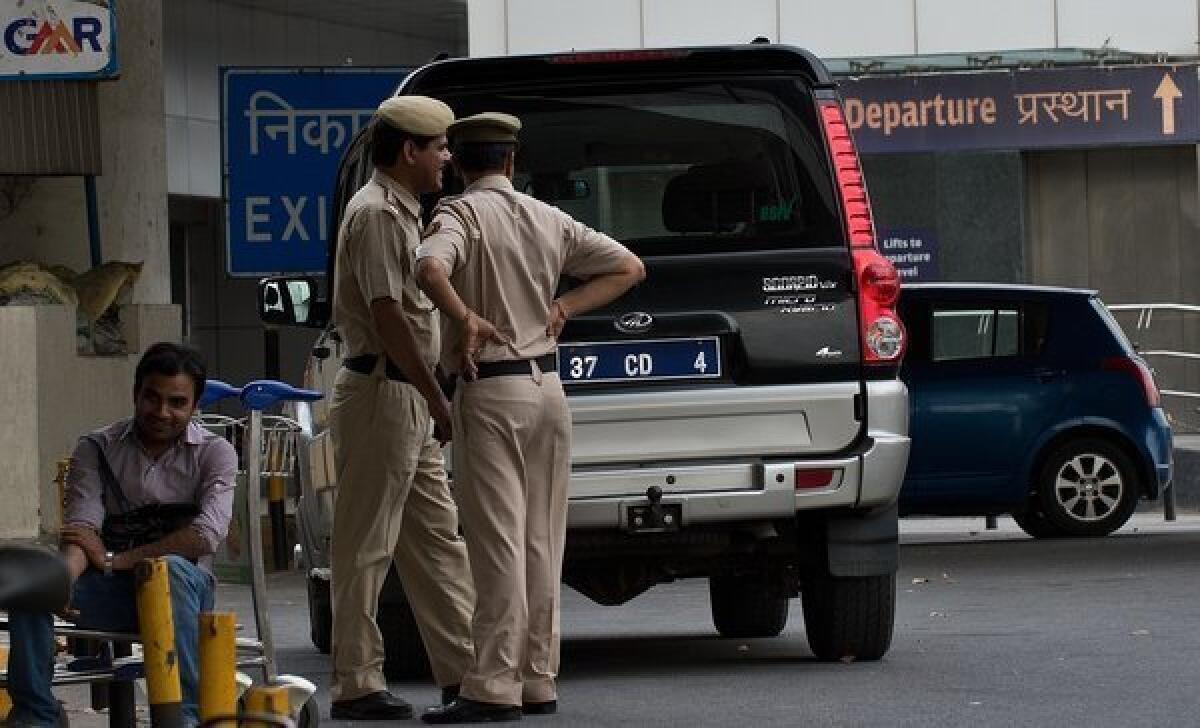Italian marines return to India to face murder charges

- Share via
NEW DELHI – Two Italian marines who had been refusing to return to India to stand trial for murder were flown back to New Delhi on Friday evening, ending a diplomatic standoff that threatened to derail relations between the two nations and test international law.
Massimiliano Latorre and Salvatore Girone are accused of killing two south Indian fishermen from the deck of a passing oil tanker in February 2012, allegedly mistaking them for pirates.
“We are very happy the Italian government is upholding the integrity and dignity of the Indian judicial process,” said Prime Minister Manmohan Singh.
The two men had been in detention here awaiting trial until last month when the Indian Supreme Court granted them a one-month leave to vote in the Italian general election. Once they were on home soil, however, Italy declared that they wouldn’t return.
Outraged, India said it wouldn’t let Italian Ambassador Daniele Mancini leave India without permission. Suspicion that Italy’s move was premeditated increased when it was learned that Italian citizens can vote by mail.
“No country can, should or will be allowed to take India for granted,” Sonia Gandhi, head of the ruling Congress party, told reporters this week.
The Indian government soon found itself on the defensive as the nation’s hyperactive media made it clear national pride was on the line. “In their eyes, India was still a semi-literate Third World country that can be brow-beaten, bribed and easily influenced,” wrote reporter G. Pramod Kumar in Firstpost, an online news portal, referring to Rome’s actions as an “Italian con job.”
As tension mounted, both sides appeared to be on thin ice. Italian ambassador had signed an affidavit personally assuring the Indian court the marines would return, prompting critics to argue that in bowing to the court’s authority he had waived his diplomatic immunity.
India, in threatening to all but hold the Italian ambassador hostage seemed very close to violating the Vienna Convention, which states that diplomats “shall not be liable to any form of arrest or detention.” While countries periodically expel diplomats during a disagreement, it’s unusual to detain them.
With the marines back in India, New Delhi can argue to voters that it safeguarded national pride and preserved the dignity of the Supreme Court.
Italy’s actions, meanwhile, help soften the impression it pulled a run-around and lower the risk of retribution after New Delhi threatened to review all trade, investment and related deals with Italian companies.
“I was sure the Italians wouldn’t come back,” said Kanwal Sibal, a former Indian foreign secretary. “It was good the restraining order stayed on paper and Italians didn’t put it to the test otherwise there would have been a crisis.”
Italy received face-saving assurances that New Delhi wouldn’t arrest the marines on arrival or subject them to the death penalty, Indian Foreign Minister Salman Kurshid said in a statement to parliament.
The marines also will be allowed to stay in the Italian Embassy rather than in an Indian cell and eat at the Italian Culture Center’s posh café. The Foreign Ministry also said the prisoners could serve any jail term in Italy.
ALSO:
Nigerian author Chinua Achebe, 82, dies
In Jerusalem, Obama honors Holocaust victims
Obama brokers Israeli apology for Turkish activists’ deaths
Tanvi Sharma in the Times’ New Delhi bureau contributed to this report.
More to Read
Sign up for Essential California
The most important California stories and recommendations in your inbox every morning.
You may occasionally receive promotional content from the Los Angeles Times.












